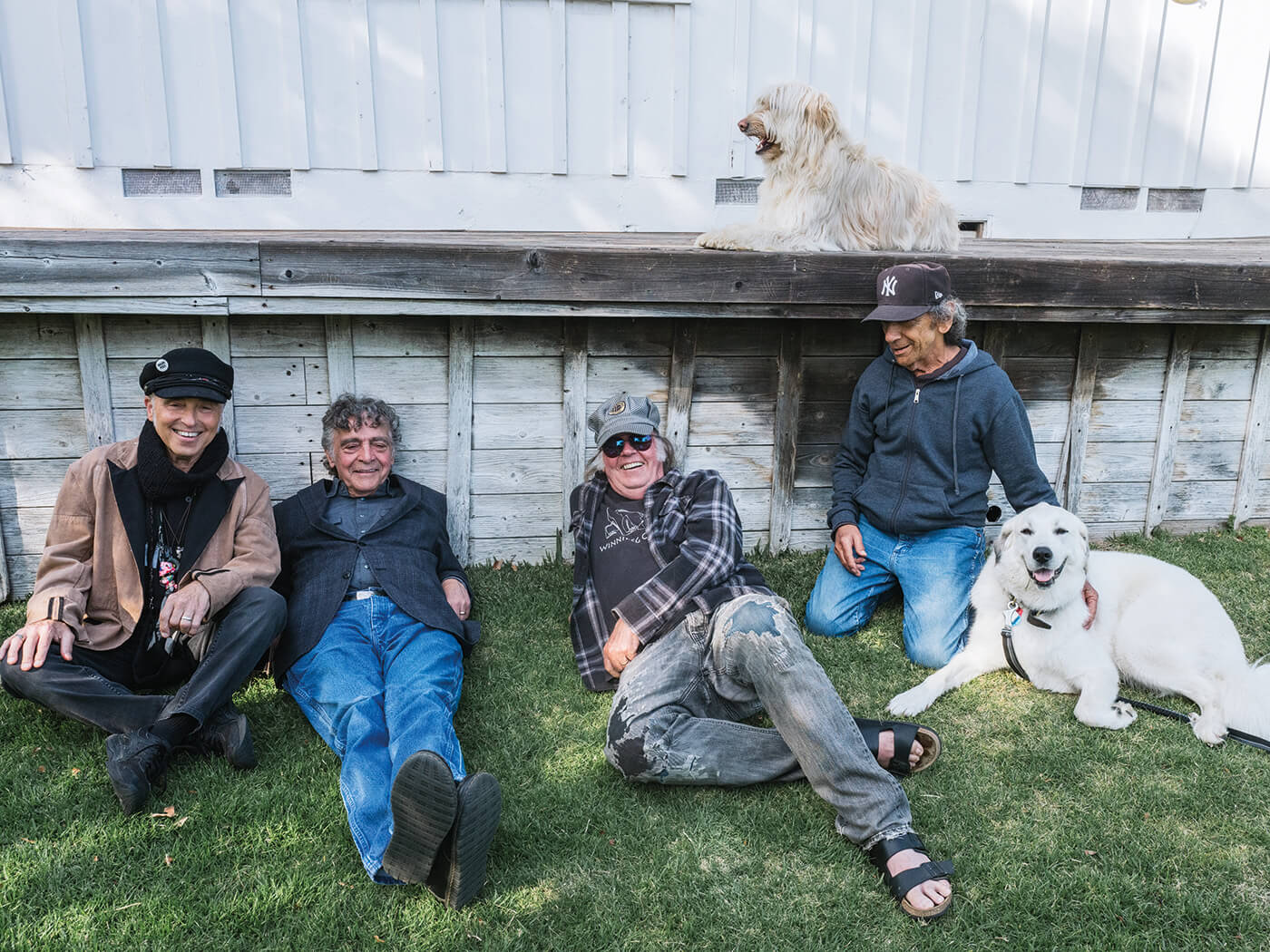It seems an obvious thing to say, but you get the feeling Neil Young’s new record is important to him. In the old days – the days that press behind the simple, shaky, beguiling, bemusing, finally burning surfaces of these songs – your first impression of the album would have been its cover. And there, without fuss, he lays things bare.
Up front comes a photograph of his father, the writer Scott Young, caught striding down the street in suit and tie, raincoat over one arm. It could be the late-1950s, and he looks like a man with places to go and things to do there. You don’t have to recognise the face to know who he is: the image comes captioned, like a museum exhibit: father 4.14.18. Inside, drawn from other eras, but similarly tagged with their DOBs, come Neil’s brother, Bob, and his mother, Rassy, with Neil himself; the first family Young knew, until he was 12 and his parents went their separate ways.
The cover’s ’50s vibe echoes into the opener, “Love Earth”, a recording warm as a harvest evening. As Nils Lofgren’s lap steel flirts with Young’s piano, and rhythm section Billy Talbot and Ralph Molina set the Horse ambling, the melody calls up one of the biggest hits of Young’s childhood, “Sh-Boom (Life Could Be A Dream)”, as recorded in 1954 by Toronto boys The Crew Cuts. The lyrics, too, seem a reference, as Young undercuts his sketch of an idyllic remembered landscape with a bittersweet sigh, “We were living in a dream”.
Is this album about his family, his childhood? Well, no. There’s nothing here as nakedly autobiographical as 1973’s “Don’t Be Denied”, or on the nose as “Heading West” on last year’s Barn. Then again, yes. As ever, environmental concerns are uppermost, but here they come expressed as recollections of the world Young knew back then, unembellished evocations of blue skies and clear water that repeat across “Love Earth”, “Overhead” (a 12-bar speakeasy stomp that references Burt Lancaster and The Beatles), “This Old Planet” (“Human Highway”’s melody treated to the sound of After The Gold Rush) and the plainly gorgeous “Walkin’ On The Road”.
At the same time, he’s walking (walking being another recurring motif; wandering alone, marching together) through the world of the present – a sense of unfolding ecological catastrophe, war, plague in the air – and he’s candid about his place in it: that there’s more road behind him now than lies ahead. “I’m so grateful to have lived for all these years”, he declares on “I Walk With You”. “I’m beyond the time I had to know”, the thought continues on “The World (Is In Trouble Now)”.
Lest this sound too reflective and autumnal, it’s worth stating that the latter track is a riot, a standout example of how, this time, Crazy Horse often manage to sound like Crazy Horse while not sounding like Crazy Horse at all.
Following 2019’s Colorado, which introduced the latest configuration of the band as Lofgren returned following guitarist “Poncho” Sampedro’s retirement, and Barn, this is the third album Young has made in a row with the Horse, the first time that’s ever happened. Barn felt like a consolidation of Colorado as the lineup settled into the well-worn Horse groove. But with World Record, Young tosses things up in the air. For much of the album, he abandons guitar and with it the classic Horse sound, opting to lead on keyboard, mostly pump organ. On “The World (Is In Trouble Now)”, as he blares gleefully at a riff borrowed from Herbie Hancock’s “Watermelon Man”, and growls the chorus in a subsonic rumble, the glorious result is a kind of sloppy drunk organic funk which resurfaces on “The Wonder Won’t Wait”.
That song gets to the essence of this quickly created album’s theme: seize the moment, or at least be aware of it. Producer Rick Rubin carefully captures a live sound, a spontaneous first-take feel exemplified by “Break The Chain”, one of the album’s two key guitar songs, a Crazy Horse thrasher in the unhinged lineage of “Welfare Mothers” and “Fuckin’ Up”, with added post-Covid anxiety.
Rather than his past, present, or future, World Record seems to be Neil Young singing about life as it just keeps happening, and never more than when he plugs Old Black in again for the epic closer, “Chevrolet”. A 15-minute Horse jam to rank with any, complete with the massed ragged Horse harmony, rather than a song about a car, it’s about different stages of Young’s life, roads he travelled, people he was with, mistakes he made. Eras blur and collide in the long instrumental breaks as he goes moving out after some mangled perfect melody that lies just beyond reach. Here, time doesn’t fade away; it burns and melts.

